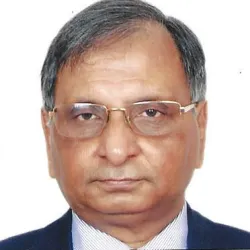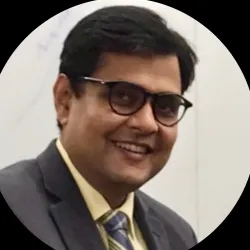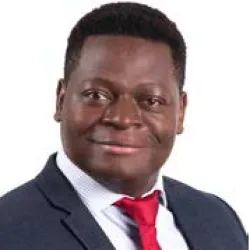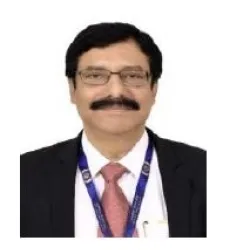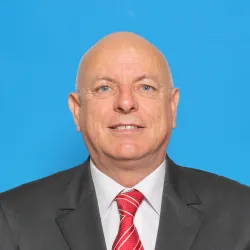2020 RegTech and SupTech: Disruptive Technology in Reporting, Regulation and Supervision
RegTech and SupTech: Disruptive Technology in Reporting, Regulation and Supervision
Regtech and Suptech: New Opportunities in Reporting, Regulation and Supervision
November 16 - 17
Course Chair: Kimmo Soramäki, Founder and CEO, Financial Network Analytics and founding Editor-in-Chief, Journal of Network Theory in Finance
In 2020, disruptive technological innovation continues to transform financial systems whilst Covid-19 brings new threats to the regulatory and supervisory regimes that protect financial systems. Cryptocurrencies are forcing regulators and supervisors to take sides, cyber threats bring new dimensions to systemic risk, and digitalisation is generating revolutionary platforms for financial crime and fraud.
Proactive application of advanced technologies like Machine Learning or DLT also opens up unprecedented regulatory and supervisory possibilities. RegTech and SupTech offer new tools and frameworks to accelerate risk-based reporting, monitor systemic risk as well as supervise financial institutions based on Big Data. Increasingly, central bankers recognise that in order to make the most of these emerging opportunities, significant change is needed: at methodological, technical and institutional levels.
This seminar, ‘Regtech and Suptech: New Opportunities in Reporting, Regulation and Supervision’ is designed to equip delegates with the tools to meet these and other current challenges facing central bankers, regulators and supervisors with an active interest in regulatory and supervisory technology.
Agenda
Participants will have access to pre-recorded presentations two weeks before the course
Data analytics for AML/CFT: AI and Machine Learning in focus
Pre-recorded presentation
15:30 - 17:00
- State of the art in AI and Machine Learning
- Key opportunities for AML and CFT
- Implications for data management, processing and analysis
- Examples of Machine Learning based software solutions for the regulators and the regulated
Kimmo Soramäki is the founder and CEO of Financial Network Analytics (FNA) and the founding editor-in-chief of The Journal of Network Theory in Finance. He started his career as an economist at the Bank of Finland where he developed in 1997 the first simulation model for interbank payment systems. In 2004 while at the research department of the Federal Reserve Bank of New York, Mr Soramäki was among the first to apply methods from network theory to improve our understanding of financial systems. During the financial crisis of 2007-2008 he advised several central banks, including the Bank of England and European Central Bank, in modelling interconnections and systemic risk. This work led him to found FNA in 2013 provide solutions to monitor the complex financial networks that play a continually larger role in the world around us. Mr Soramäki holds a Doctor of Science in Operations Research and a Master of Science in Economics (Finance), both from Aalto University in Helsinki.
BigTech: the new focus of regulatory attention
Pre-recorded presentation
00:00 - 00:30
- Characteristic features of the BigTech sector and entities
- Impact and implications of BigTech for the financial services and technology providers
- Overview of local and cross-jurisdictional efforts focused on regulation and supervision of BigTech
- Discussion: who are the BigTechs in the delegates’ home jurisdictions?
Anand Sinha joined the Reserve Bank of India (RBI) in July 1976 and became deputy governor in January 2011. He was adviser in RBI up to April 2014 after demitting the office of deputy governor in RBI on January 18, 2014. As deputy governor, he was in charge of regulation of commercial banks, non-banking financial companies, urban cooperative banks and information technology, among others. He has represented the RBI in various Committees/Groups of the Bank for International Settlements (BIS), was on the G20 Working Group on Enhancing Sound Regulation & Strengthening Transparency and also a board member of the Securities and Exchange Board of India. He holds master’s degree in physics from the Indian Institute of Technology, New Delhi.
Sandboxes, incubators and accelerators: the key pillar of nurturing compliant innovation
Pre-recorded presentation
17:15 - 18:45
- Sandboxes, incubators and accelerators: a central bankers guide
- Role and functions in innovation strategies
- Tips for helping innovation comply with legal and regulatory requirements
- Issues for funding resourcing cross-jurisdictional cooperation
Brian Knight
Senior research fellow and director of innovation and governance
George Mason University
Brian Knight is the director of the Program on Financial Regulation and a senior research fellow at the Mercatus Center at George Mason University. His research focuses on numerous aspects of financial regulation, including the creation of pro-innovation regulatory environments and the role of federalism in fintech regulation. Prior to joining Mercatus, he worked for the Milken Institute, where he headed up the FinTech and Capital Access programs. Mr. Knight also has experience working for a broker-dealer with a focus on the emerging online private-placement market and was the co-founder of CrowdCheck, a company providing due-diligence and disclosure services to companies and intermediaries engaged in online private offerings. Mr. Knight received his Law degree from the University of Virginia and his bachelor’s degree from the College of William and Mary.
SupTech for effective supervision of systematically important financial institutions
Presentation followed by Q&A
00:00 - 01:00
- Overview of the D-SIB (domestically systemically important) and G-SIB (global systemically important) frameworks
- Examples of RegTech and SupTech applications for D-SIB and G-SIB identification and continuous oversight
- Implications for cooperation between the regulator and the regulated
- Tips to overcome issues of cross-jurisdiction communication and coordination
Manoj Kumar Singh is a central banker with more than 14 years of experience, working currently in the area of supervision and supervisory policy development with Reserve Bank of India. His areas of expertise include risk-based supervision, fintech, regtech/suptech, with proper balance on both the challenges and opportunities.
New opportunities in AML, CFT and Anti-fraud
Pre-recorded presentation
00:00 - 00:30
- Key financial crime risks of the digital era
- Examples of Big Data and Machine Learning applications in KYC and KYCC
- The role of international and public-private cooperation and coordination
- Hands-on exercise: automated vs manual Fraud and AML investigation
Times in GMT
11:00 – 11:30
Course introduction
Opening remarks with the course chair
00:00 - 00:30
- Introduction of the chairman
- Overview of the training course
- Discussion of the delegate expectations
11:30 – 12:30
RegTech and SupTech: technological foundations in 2020
Presentation followed by Q&A
00:00 - 01:00
- Evolution of financial, regulatory and supervisory technology
- The impact of RegTech and SupTech on the financial services industry
- Overview of key technologies in the areas of DLT, Big Data analytics, Machine Learning and Cloud Computing
- Examples of applications in regulatory reporting and compliance risk management
Kimmo Soramäki is the founder and CEO of Financial Network Analytics (FNA) and the founding editor-in-chief of The Journal of Network Theory in Finance. He started his career as an economist at the Bank of Finland where he developed in 1997 the first simulation model for interbank payment systems. In 2004 while at the research department of the Federal Reserve Bank of New York, Mr Soramäki was among the first to apply methods from network theory to improve our understanding of financial systems. During the financial crisis of 2007-2008 he advised several central banks, including the Bank of England and European Central Bank, in modelling interconnections and systemic risk. This work led him to found FNA in 2013 provide solutions to monitor the complex financial networks that play a continually larger role in the world around us. Mr Soramäki holds a Doctor of Science in Operations Research and a Master of Science in Economics (Finance), both from Aalto University in Helsinki.
12:30 – 12:45
Break
00:00 - 00:15
12:45 – 13:45
Making the most of ‘Artificial Intelligence in risk-based reporting
Presentation followed by Q&A
00:00 - 01:00
- Overview of the challenges facing regulators
- How regulators are responding to the challenges
- The development of Suptech
- How AI / ML fit into the Suptech landscape
- The key AI use cases for different regulatory environments
- The challenges with implementing these / where does one start?
Daniel is responsible for leading the Prudential Authority’s transformation initiatives. He is an experienced executive with a keen interest in strategy implementation and business transformation. He started his career in IT and Business consulting, spending over a decade engaging with clients predominantly in financial services, across sub-Saharan Africa. Between 2015 and 2017, Daniel set up and headed the regional office of a local consulting company. In November 2017, he joined the South African Reserve Bank (SARB). He holds an MBA from the Gordon Institute of Business Science and a Bachelor of Business Science Honours degree from the University of Cape Town.
13:45 – 14:00
Break
00:00 - 00:15
14:00 – 15:00
Redesigning Risk Management Architecture - Now on
12:45 - 13:45
A central banker for more than three decades and half, he was the Executive Director in charge of Supervision & SupTech of RBI. He had earlier held the position of Principal Chief General Manager of Risk Monitoring Department of RBI, and the Head of the Reserve Bank Staff College, Training Institute of senior central banking professionals of RBI, at Chennai. He was the Head of Financial Stability Unit in RBI and had advised Central Bank of Oman in setting up of their Financial Stability Department, post-crisis. He was RBI’s Regional Director for the States of Jharkhand & Uttar Pradesh. His professional expertise hinges on Bank Regulation/Supervision, Financial Stability - Macro-Financial Surveillance and Risk Mitigating Mechanics in Banking and Central Banks. He has been RBI’s Nominee with the Analytical Group on Vulnerabilities and the Supervisory & Regulatory Co-ordination Committee at the Financial Stability Board. He was the RBI’s Nominee in NABARD’s Board of Supervision and Director in Punjab national Bank and Indian bank.
He is a Chattered Associate of Indian Institute of Banking & Finance (CAIIB) and an awardee of the Golden Jubilee Scholarship of RBI and the Diamond Jubilee Fellowship of Indian Institute of Banking and Finance (IIBF).
15:00 – 15:00
End of day 1
00:00 - 00:01
Times in GMT
11:00 – 12:00
Visualising systemic risk
Interactive workshop with delegate participation
00:00 - 01:00
- Methods and practices for combining available technologies and digital platforms for visualising different types of systemic risk
- Tips to effectively analyse complex financial data and filter signal from noise
- Management of key operational and ethical risks and challenges
- Hands-on exercise: mapping of cross-holdings between financial institutions and identification of early warning indicators
Kimmo Soramäki is the founder and CEO of Financial Network Analytics (FNA) and the founding editor-in-chief of The Journal of Network Theory in Finance. He started his career as an economist at the Bank of Finland where he developed in 1997 the first simulation model for interbank payment systems. In 2004 while at the research department of the Federal Reserve Bank of New York, Mr Soramäki was among the first to apply methods from network theory to improve our understanding of financial systems. During the financial crisis of 2007-2008 he advised several central banks, including the Bank of England and European Central Bank, in modelling interconnections and systemic risk. This work led him to found FNA in 2013 provide solutions to monitor the complex financial networks that play a continually larger role in the world around us. Mr Soramäki holds a Doctor of Science in Operations Research and a Master of Science in Economics (Finance), both from Aalto University in Helsinki.
12:00 – 12:15
Break
00:00 - 00:15
12:15 – 13:15
Cloud Computing approach: its risks & benefits
Presentation followed by Q&A
00:00 - 00:30
13:15 – 13:30
Break
00:00 - 00:15
13:30 – 14:30
The regulation of online lending: China’s P2P case study
Presentation followed by Q&A
00:00 - 01:00
- Overview of tight vs light regulation of P2P platforms
- Issues related to separation of information intermediation from financial intermediation in P2P
- Classification of P2P like a bank or an investment fund
- Implications for credit risk analysis
Herbert Poenisch
Former senior economist, BIS, and senior fellow, Academy for Internet Finance, Zhejiang University
Former Bank for International Settlements
Basic info: Austrian citizen, resident in Penang, Malaysia and Houlgate, France
Education: University of Linz, Austria (PhD) and Oxford University, UK (MLitt)
Present position: retired from Bank for International Settlements, Senior Fellow, Academy for Internet Finance, Hangzhou and member of International Committee at International Monetary Institute, Beijing (2016- present)
Former Positions: Advisor to SEACEN and BNM (2010-2016)
Senior Economist, Monetary and Economic Department, BIS (1990 -2010). Seconded to IMF
Economist at Austrian National Bank (1977-1990). Seconded to IMF, OECD, ADB, BIS
Publications: see LinkedIn herbert.poenisch
14:30 – 15:00
Break
00:00 - 00:15
15:00 – 15:30
Networking break
15:30 - 16:00
Post training survey and feedback
00:00 - 00:30
CPE/CPD certificate
00:00 - 00:30
Course alumni group
00:00 - 00:30
Chair

Kimmo Soramäki
Founder and CEO
FNA
Kimmo Soramäki is the founder and CEO of Financial Network Analytics (FNA) and the founding editor-in-chief of The Journal of Network Theory in Finance. He started his career as an economist at the Bank of Finland where he developed in 1997 the first simulation model for interbank payment systems. In 2004 while at the research department of the Federal Reserve Bank of New York, Mr Soramäki was among the first to apply methods from network theory to improve our understanding of financial systems. During the financial crisis of 2007-2008 he advised several central banks, including the Bank of England and European Central Bank, in modelling interconnections and systemic risk. This work led him to found FNA in 2013 provide solutions to monitor the complex financial networks that play a continually larger role in the world around us. Mr Soramäki holds a Doctor of Science in Operations Research and a Master of Science in Economics (Finance), both from Aalto University in Helsinki.
Learning outcomes
By the end of the training course, participants will have gained new knowledge and a more comprehensive understanding of:
- The importance of RegTech and SupTech in a crisis
- Opportunities and risks of machine-executed regulation
- Case studies of regulatory Big Data uses and applications
- How to make the most of Machine Learning, DLT and Cloud in risk-based reporting
- Frameworks and strategies for effective regulation and supervision of crypto assets
- Hands-on exercises on applications of RegTech and SupTech for AML and cyber risk management
- Case studies of regulatory sandboxes, incubators and accelerators

